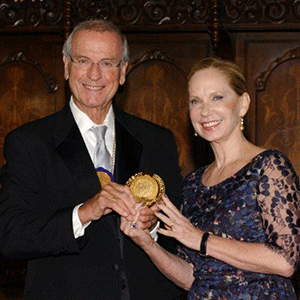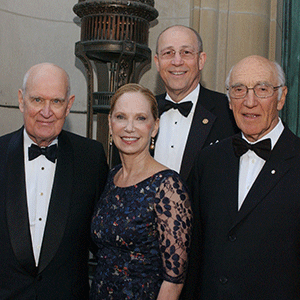Renowned surgeon Susan E. Mackinnon, MD, of Washington University School of Medicine in St. Louis and Barnes-Jewish Hospital, received the 2013 Jacobson Innovation Award of the American College of Surgeons (ACS) at a dinner in her honor Friday, June 7, in Chicago.
Mackinnon, the Sydney M. Shoenberg Jr. and Robert H. Shoenberg Professor and chief of the Division of Plastic and Reconstructive Surgery, received the international surgical award for her leadership in developing innovative nerve-transfer procedures to treat patients with devastating peripheral nerve injuries.

(Credit: American College of Surgeons)
The Jacobson Innovation Award honors living surgeons who have been innovators of a new development or technique. The award stems from a gift from Julius H. Jacobson II, MD, and his wife, Joan. Jacobson is a general vascular surgeon known for his pioneering work in the development of microsurgery.
Before Mackinnon’s surgical approach came to light, the traditional treatment of peripheral nerve injuries involved repairing the nerve at the site of the injury with microsutures and expendable sensory nerves from elsewhere in the body. However, with this method, nerve regeneration was slow and return of muscle function often was poor. In 1991, Mackinnon began zeroing in as closely as possible on the motor endplates of the muscle that had been denervated.
Her surgical approach involves working with expendable branches within major nerves that are nearer the compromised muscle. Essentially, the nerve-transfer technique changes a high-level proximal injury (such as at the neck) to a more distal injury (such as at the axilla, arm, forearm or hand) and avoids the detrimental impact of prolonged muscle denervation.
Mackinnon performed the first nerve transplant in 1988, using nerves from a cadaver to restore feeling and movement to a boy’s injured leg. That landmark operation began a quarter century of novel work in nerve transplantation and led to many other surgical firsts.
In 2012, Mackinnon and her surgical team at Barnes-Jewish received worldwide attention for a nerve-transfer procedure that successfully enabled a quadriplegic patient to regain some use of his hand.

Mackinnon’s groundbreaking work has produced a paradigm shift in the treatment of peripheral nerve injuries. Today, surgeons introduce new nerve transfers on a regular basis. By contrast, nerve grafts — which previously added a year or two of nerve regeneration — are avoided altogether. Legions of patients who have regained function in their injured arms and legs have benefited from Mackinnon’s insightful approach to developing nerve-transfer operations.
Mackinnon, a fellow of the Royal College of Surgeons of her native Canada and of the American College of Surgeons of the United States and Canada, has been responsible for the interdisciplinary training of a generation of specialists interested in the surgical treatment of peripheral nerve injuries, including neurosurgeons, orthopedists and plastic surgeons.
She credits her success in the field to three decades of research funding support that she has received from the Medical Research Council in Canada and the National Institutes of Health (NIH) in the United States. She also credits her success to having worked at two outstanding academic institutions — the University of Toronto and Washington University — and with a talented research team for three decades.
Washington University School of Medicine’s 2,100 employed and volunteer faculty physicians also are the medical staff of Barnes-Jewish and St. Louis Children’s hospitals. The School of Medicine is one of the leading medical research, teaching and patient care institutions in the nation, currently ranked sixth in the nation by U.S. News & World Report. Through its affiliations with Barnes-Jewish and St. Louis Children’s hospitals, the School of Medicine is linked to BJC HealthCare.